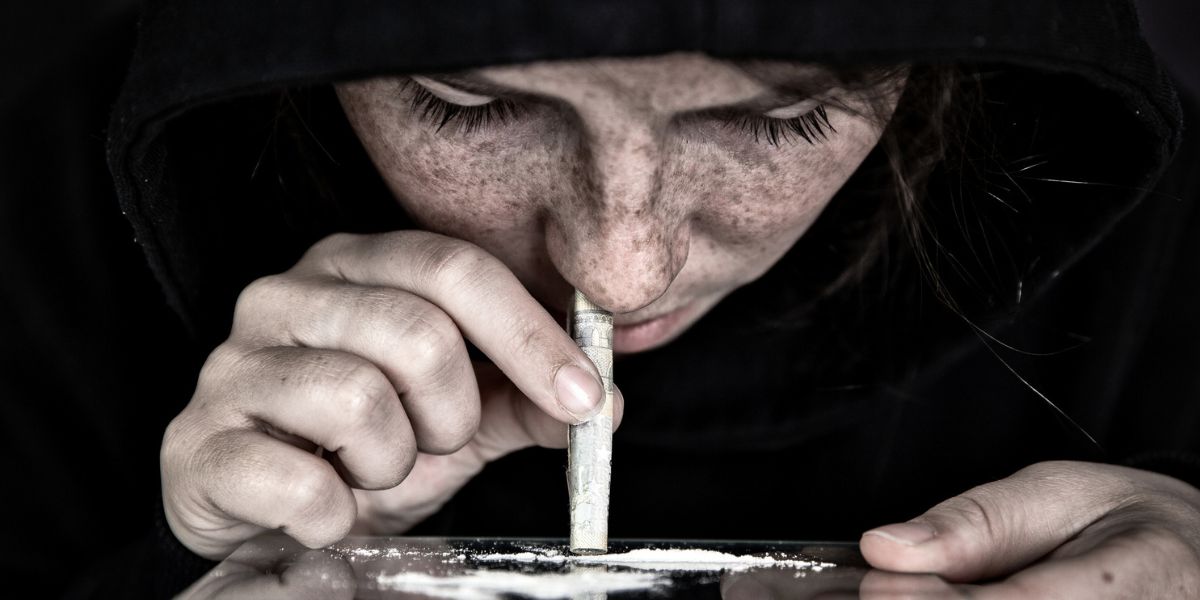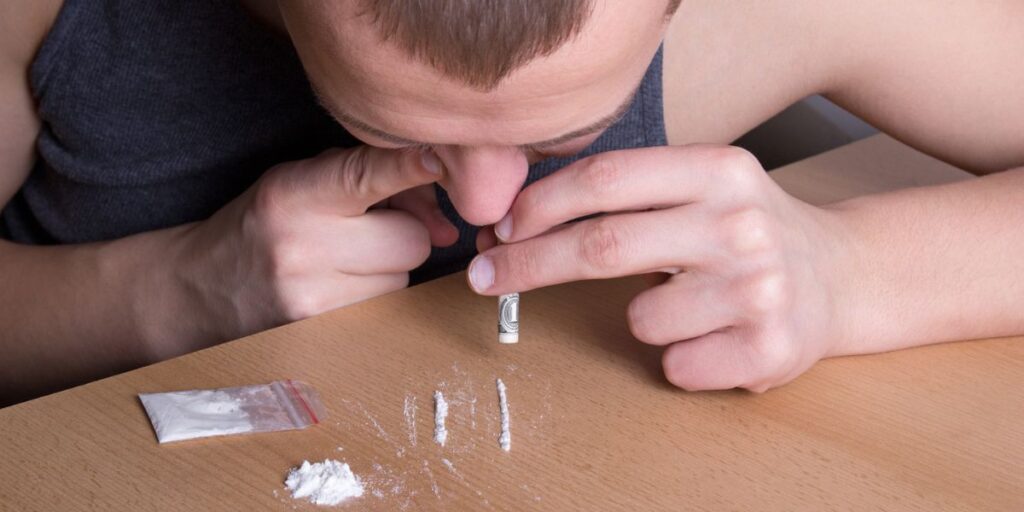Signs of Cocaine Abuse


Medical Writer:
Reviewer:

Johnny Kim
Executive Psychotherapist
Medical Writer:
Reviewer:

Johnny Kim
Executive Psychotherapist
Every year, over a million people in the United States get addicted to cocaine and may struggle without help.
Cocaine comes in two types: a white powder and a hard, crystal-like form called crack cocaine. People can inject, sniff, or smoke both kinds of cocaine.
Table of Contents
TogglePeople often link powdered cocaine, also known as blow or coke, to wealthy living and parties. In contrast, people perceive crack cocaine as lower class and as indicating severe addiction.
Cocaine addiction presents a grave challenge, often resulting in severe repercussions. The drug, available as either powder or crack, is exceptionally addictive, precipitating various physical and psychological health issues. People with cocaine addiction have a hard time controlling how much they use. They get stuck in a cycle of needing the drug and find it difficult to stop.
People addicted to cocaine may do risky things to get more of the drug. They might engage in dangerous activities to satisfy their cravings. Such behaviors may encompass theft, deceit, and exposing themselves to risky environments. The intense craving for coke can make it hard to think clearly or control oneself, leading to a worsening addiction.
The dangers of coke addiction extend beyond the immediate physical impacts of the drug. Long-term use of cocaine can result in a spectrum of health complications, such as cardiovascular difficulties, respiratory ailments, and psychiatric conditions. Moreover, the lifestyle frequently associated with cocaine addiction can precipitate financial instability, deteriorating relationships, and encounters with the legal system.
Identifying the signs of cocaine addiction, understanding cocaine-associated health risks, and knowing the treatment options available can prevent years of hardship for you or someone close to you.

Signs of Cocaine Abuse
The signs and symptoms of cocaine addiction and abuse are noticeable in various areas of a user’s life, impacting their physical, mental, and behavioral health. These changes can range from subtle to profound, depending on the person and the severity of their addiction.
People struggling with cocaine addiction often face financial difficulties, deceive their loved ones, or resort to theft to conceal and sustain their drug use.
Moreover, the interplay between cocaine addiction and concurrent disorders can lead to deteriorating mental health, severe mood fluctuations, and progressively dangerous behaviors.
Physical Symptoms of Cocaine Abuse
One of the initial and simplest methods to identify cocaine use is to observe the physical signs and symptoms. These symptoms typically appear within 5 to 20 minutes, varying based on the purity, quantity of coke consumed, and the method of ingestion.
The physical effects of cocaine abuse include:
- Enlarged pupils
- Snuffling
- Nasal discharge
- Agitation
- Fidgeting
- Rapid eye movement
- Jaw clenching
- Sweating
- Chest pain
- Nosebleeds
- Sore throat
- Bloodshot eyes
- Headache
- Nausea
- Rapid pulse
- Elevated blood pressure
- White powder residue in the nostrils (from snorting)
- Needle marks (from injecting)
- Burnt fingers or lips (from smoking)
Many users may attribute their symptoms to allergies or colds to deflect attention from their drug use. Therefore, understanding the short-term and long-term effects of cocaine addiction is crucial if you intend to confront someone about their substance abuse.
Effects of Cocaine Abuse
Because of its potent nature, the effects of cocaine and crack cocaine become noticeable after just a few instances of use.
The immediate effects of cocaine abuse include the following:
- Increased energy
- Heightened sensitivity to light and noise
- Agitation
- Emotional instability
- Nose bleeding
- Regular sore throats
- Feeling restless or nervous
- Absence of restraint
- Suspicion and distrust
- Diminished sense of smell
- Sleeplessness
- Decreased hunger
- Involuntary shaking
Both cocaine and crack are highly addictive; without treatment, the prolonged impacts of coke addiction can be fatal.
The enduring effects of cocaine addiction include:
- Loss of weight
- Sleeplessness
- Despondency
- Uneasiness
- Thoughts of suicide
- Delusions of persecution
- Renal impairment
- Hepatic injury
- Breathing difficulties
- Impaired immune system
- Damage to soft tissues in the nasal passage, throat, and esophagus
- Intestinal decay
- Vein collapse
- Contaminated injection areas
- Neurological damage
- Sexual impairment
- Cerebrovascular accidents
- Myocardial infarctions
- Withdrawal indications
- Overdosing
The symptoms of cocaine overdose resemble many of the signs previously described.
If you suspect an overdose is occurring, immediately dial 911. It is always wise to be cautious, and an emergency department visit along with medical care could serve as a crucial alert for someone to initiate treatment for their addiction.

Cocaine Withdrawal
Cocaine withdrawal may start while traces of the drug remain in the body, mainly if the person frequently consumes large quantities of coke. The symptoms of coke withdrawal are primarily psychological, with some physical aspects. Additionally, mental health disorders often intensify during withdrawal, rendering the psychological symptoms as critical and pressing as the physical ones.
Cocaine withdrawal symptoms include:
- Irritability
- Unsettled conduct
- Strong urges
- Tiredness
- Graphic and unsettling dreams
- Despondency
- Thoughts of suicide
- Heightened hunger
- Sluggishness
- Extended durations of sleep
- Cold sweats
- Tremors
- Fluctuations in body heat
- Diminished sensitivity
Withdrawal symptoms from cocaine are seldom life-threatening. However, the psychological effects and discomfort frequently result in relapse, self-harm, and other hazardous behaviors.
Cocaine Addiction Treatment
If you or someone you care about is battling addiction to cocaine or multiple substance use disorders, help is accessible, and a better life is achievable.
White Oak Recovery Center utilizes evidence-based treatments and therapies to guarantee significant progress in our programs. WORC recognizes that recovery is more than just achieving sobriety— it’s an opportunity for a new beginning in life. We are committed to making a lasting impact that helps you overcome addiction permanently.
Your health insurance benefits might cover the expenses for your treatment. You can confidentially confirm your insurance details here, and a compassionate treatment specialist from our team will reach out to you shortly to answer any queries you may have.
Let us customize a treatment plan for you to lead a fulfilling, joyful, and healthy life in recovery. Contact us today.

Am I covered for addiction treatment?
Your insurance may cover treatment. Call now for an entirely free and confidential assessment. Recovery starts with a phone call.

- Richards, John R. and Le, Jacqueline K., “Cocaine Toxicity.” StatPearls, Jun. 2023.
- Morton, Alexander W., “Cocaine and Psychiatric Symptoms.” Primary Care Companion J Clin Psychiatry, Aug. 1999.
- Schwarts, Elizabeth K.C., et al., “Cocaine Use Disorder (CUD): Current Clinical Perspectives.” Sep. 2022.
- “What Are the Signs of Having a Problem With Drugs?” National Institute on Drug Abuse, Jan. 2021.
Medical Disclaimer:







